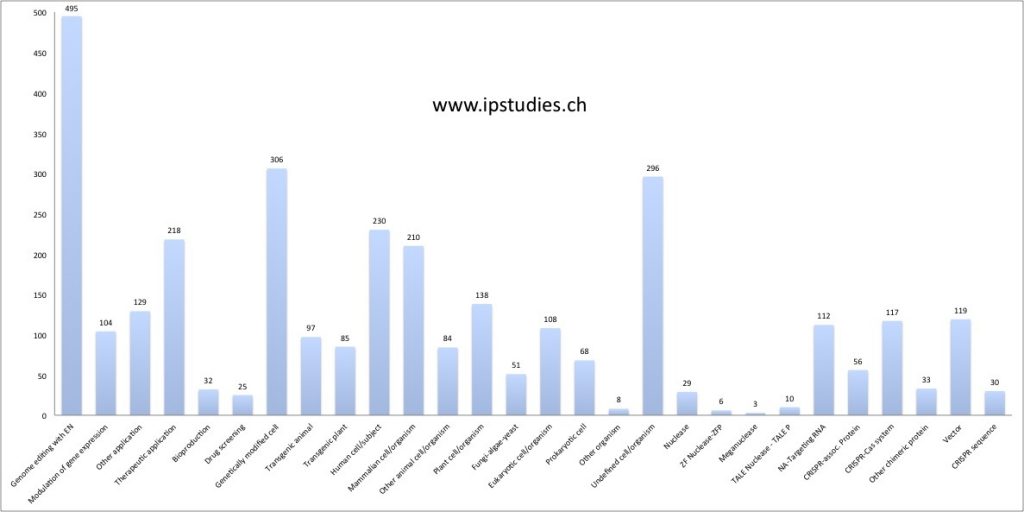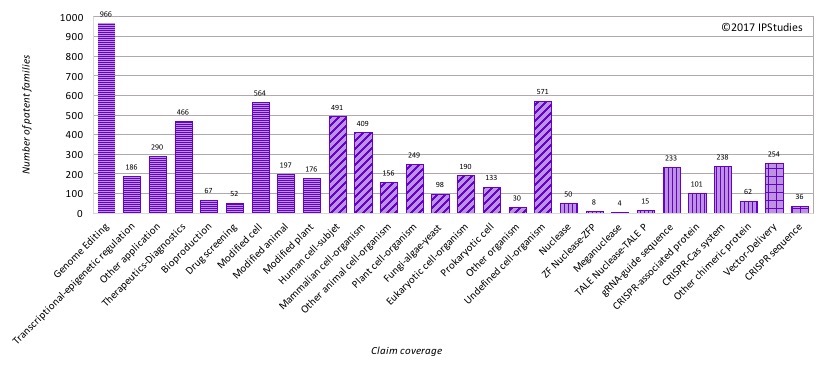Emmanuelle Charpentier and Jennifer Doudna just received a few hours ago the Nobel prize in Chemistry 2020 for “the development of a method of genome editing”, namely their 2012 discovery of the CRISPR/Cas9 genetic scissors which basically enables to “cut and paste” DNA. This scientific discovery has fueled an unprecedented biotechnology development in the past 8 years. When we started to analyze the genome editing patent landscape in Spring 2014, there were only 96 patent families(*) in our records in relation with CRISPR. We have now more than 7400 in our latest records – and adding an average of 200 more every month in 2020. What does this data tell us on who has taken advantage in engineering new life sciences solutions out of this amazing scientific discovery, now confirmed worth a Nobel Prize?
Continue readingTag: USPTO
April 2017 – CRISPR update
The CRISPR patent landscape kept on developing since February with more than 100 new patent publications in the past two months. We have now searched, reviewed and categorized 1340 patent families in our latest CRISPR patent analytics data set. Continue reading
Recent developments in the CRISPR patent landscape
The CRISPR patent landscape keeps on developing with now an average of two new patent publications every day. We have now searched, reviewed and categorized 1198 patent families in our February 2016 CRISPR patent analytics data set. The recent conclusions by the USPTO on the CRISPR pioneering patent interference has received significant media attention and finally confirmed the diversity of the CRISPR licensing landscape. We have provided our 2017 key findings to a number of analysts in the field, and are working hard to keep on extracting and sorting meaningful CRISPR patent coverage information for our customers on a monthly basis.
The IPStudies 2017 CRISPR patent landscape is out, don’t miss it!
The CRISPR patent landscape keeps on developing at an increasing pace in 2017, with now up to three new patent families published every day! We have searched, reviewed and categorized more than 1146 patent families, now surveyed in our just released 2017 CRISPR patent landscape report.
Will the CRISPR patent landscape soon move to a one-stop license shopping?
The past 24 hours have brought new light and significant moves in the complex CRISPR patent landscape.
First (that was in European time zone!), our CRISPR expert Fabien Palazzoli celebrated the 1000th CRISPR patent family extraction out of the worldwide published patent databases. Our next monthly update will actually feature more than 1050 classified and categorized CRISPR patent families – more than 10 times the initial set of our first landscape release back in summer 2014!
CRISPR patent analytics – July 2016 update
From January to July 2016, our CRISPR patent monitoring set has almost doubled, from 489 to 787 published patent families. We now search, review and classify them on a monthly basis to stay up to date, watching for the latest technology coverage and application developments as can be derived from the individual patent claims.
CRISPR patent analytics – April 2016 update
For the first quarter of 2016, we have added another 105 patent families to our CRISPR patent monitoring set. The CRISPR patent landscape keeps on growing steadily, with on average one new CRISPR patent family publication every day.
Our updated claim coverage analysis confirms the trends and facts we’ve reported in our detailed January 2016 patent landscape. 
Less licensing deals have been announced in the past few months, as the whole industry is watching for USPTO updates on the PTAB interference between two of the pioneering patent filings. More qualitative financial analysts are also now monitoring the outcome of this dispute, after the first successful CRISPR IPO (NASDAQ:EDIT) by Editas, a licensee of the pioneering Broad Institute patents, and the early April announcement of its own IPO filing by rival Intellia, a licensee of the pioneering University of California patent. In Europe, the CRISPR patent landscape is just as uncertain, with multiple (many anonymous – “strawman”) oppositions filed on the first granted patents.
While the uncertainty surrounding the licensing of the core technology patents is getting most media and business attention currently, the next rounds are already taking shape behind this main scene, with near 600 silent patent families claiming their own exclusive share of technology improvements, design-around attempts, and a myriad of specific application developments. There will be further disputes, settlements, and maybe even patent pools in the CRISPR era. The whole data is there, in multiple patent offices and databases – at IPStudies, we search, retrieve, sort and classify this data set to facilitate the CRISPR technology and competition watch for our customers: for more information on our patent landscape and patent monitoring services, check our CRISPR patent analytics offering or send us your inquiry through our contact form.
IP management practices – How early inventor collaboration can help faster granting at USPTO
In the CRISPR-CAS patent landscape, the file history of US patent 8’697’359 by Dr. Feng Zhang from the Broad Institute highlights how a “get this one granted fast” IP strategy can be enforced in IP management practice with a strong collaboration from the inventors, at least in the USPTO prosecution, and especially in a research field where a large part of the prior art is academic.
IP management practices – Findings from the CRISPR-Cas landscape
When initially building our CRISPR-Cas patent landscape database over this summer, we were surprised by some unusual inventor patterns. As we now monitoring deeper into this data subset for our customers, we are further amazed by how some inventors and applicants are already strongly defending their IP position by various means in the diversity of international patent prosecution law practices – an IP management lesson of its own!

